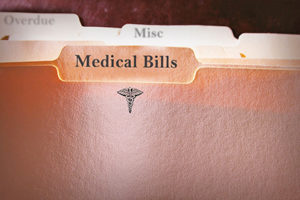What happens to debt when you die?
Posted on October 2, 2016 by bob in Features, MoneyWise

By Jocelyn Baird, NextAdvisor.com
Though it isn’t a topic many people like to talk about, we’re all going to die someday, and making preparations for the inevitable can save the people you love a lot of unnecessary grief. Of course, it isn’t always possible to plan for death, but any person with an outstanding loan, mortgage, car payments or credit card debt should be mindful that when they die, their debt might become the responsibility of their loved ones. And considering eight out of 10 Americans are in debt, that’s most people. The manner of how debt is handled after death varies, and there are no hard and fast rules, but there are some general things to keep in mind, whether you’re preparing for your own passing or you’re a friend or family member handling the passing of someone in your life. To learn exactly what happens to your debt when you die, we looked at different types of debt to explain what you — and your loved ones — can expect, and how you can best prepare.
Who handles your debts when you die?
When a person has died, there is typically an executor, such as an adult child or a trusted friend or a lawyer, who is in charge of handling their assets. This person will be appointed by the deceased prior to death, either in person or through their will, or if no executor was chosen before death, one will be appointed by following a state priority list or through a probate court, if necessary. Not all assets are distributed by a person’s will, so even if there isn’t a will, many of a dead person’s assets can be sorted by looking at the documentation they signed which designates beneficiaries.
One of the duties of an executor is handling the payment of the deceased’s debts. It’s important for the executor and/or family members to make sure that creditors are notified of the death so accounts don’t continue to be charged or accumulate fees, whether it’s a phone bill or a credit card. It’s a good idea to obtain extra copies of the death certificate, in case you’re asked to provide it for proof. Once debts are paid off, what’s remaining of the estate will be distributed.
What happens to specific types of debt?
Just as each debt reports to your credit reports differently, the type of debt also impacts what happens to it after the account holder dies. It should be noted that while the rules we detailed below apply to most situations, if you live in one of the nine community property states — Arizona, California, Idaho, Louisiana, Nevada, New Mexico, Texas, Washington and Wisconsin — you may have to abide by other rules and even find yourself on the hook for a spouse’s debt after they die, even if you aren’t a cosigner.

Credit card debt: If the credit card is owned by a single person, then their estate will be responsible for any remaining balance after death. However, if it’s a joint credit card account with a cosigner, such as a spouse or child, then that person will held liable. Anyone else in the deceased’s life, including any authorized users on the credit card account or the person’s spouse, cannot be held accountable by the credit card companies. It’s important that any authorized or joint users do not use the card after the account holder’s death to avoid racking up extra fees.
To try and prevent things from getting too messy, some legislation has been enacted, including the Credit Card Act of 2009, which requires credit card companies to notify the estate quickly of any remaining balance on an account. This act also forbids the credit card company from tacking on additional fees or penalties while the estate is being settled. If there aren’t enough assets to pay the remaining credit card balance(s), the credit card company might try to contact family members to settle the debt. However, unless the account is in the family member’s name, nobody can be held liable and the credit card company may wind up taking a loss.
 Loan debt: Student loan debt depends entirely on your loan source — private or government. Fully-backed federal loans (as well as federal PLUS loans for parents) will be discharged completely upon death. Private loans, however, depend entirely on your lender. Some lenders do offer death and disability forgiveness, but most don’t. If a person with an unpaid private student loan dies, the lender will first attempt to collect the remaining balance from their estate. If there isn’t an estate (or enough in the estate to cover the total), then it’s down to the loan cosigner (if there is one) or the person’s spouse. It’s important to note that spousal inheritance of student loan debt is dependent on state laws, so you and your spouse might want to check those out when discussing finances, as some states offer educational exceptions for spouses who haven’t cosigned the loan.
Loan debt: Student loan debt depends entirely on your loan source — private or government. Fully-backed federal loans (as well as federal PLUS loans for parents) will be discharged completely upon death. Private loans, however, depend entirely on your lender. Some lenders do offer death and disability forgiveness, but most don’t. If a person with an unpaid private student loan dies, the lender will first attempt to collect the remaining balance from their estate. If there isn’t an estate (or enough in the estate to cover the total), then it’s down to the loan cosigner (if there is one) or the person’s spouse. It’s important to note that spousal inheritance of student loan debt is dependent on state laws, so you and your spouse might want to check those out when discussing finances, as some states offer educational exceptions for spouses who haven’t cosigned the loan.
Other types of loans will be handled similarly to private student loans. Again, the general rule is that any loan with a cosigner will become that cosigner’s responsibility should the primary signer die. If you’re considering cosigning a loan with someone, definitely keep this fact in mind before you go through with it.
Mortgages and auto loans: Since both of these loans are secured with the property they exist to pay for, in the event of the borrower’s death,

the lender will either require the loan be paid in full or take back and sell the property to satisfy the debt. However, in the event that there is a co-owner or someone has inherited the property from their deceased loved one, that person may take over the mortgage payments. If it’s possible, the estate might pay off the remaining loan as well, making it so whoever takes over the property doesn’t have to take over payments or refinance the loan. This is absolutely a case where it’s important for the estate executor to be in communication with the creditors as well as anyone involved to prevent the loss of property to foreclosure or reclamation.

Medical debt: Similar to credit card debt, unless someone has signed any documents taking on responsibility for the deceased’s medical bills, then unpaid debts will be handled by the executor. If there isn’t enough money in the estate to pay off the debt, it will not be inherited by anyone else. As always, some exclusions to this rule may apply, so check with your local laws and always make sure to read any paperwork thoroughly before signing if you’re dealing with a loved one in the hospital or putting an elderly parent into a nursing home.
What should I do if I’m being asked to pay a debt?
Sometimes, creditors may try to pressure relatives of a deceased person to pay off outstanding debts. However, unless you were a joint account owner or cosigned, they probably have no ground to stand on. The laws vary from state to state, but in most cases, if you are contacted about a debt owed by a deceased loved one, it’s best to not engage with the debt collector and instead contact the executor of the estate. The FTC has outlined some rules regarding what creditors can and cannot do when trying to collect on a debt owed by a person who has passed.
Watch out for identity theft
Unfortunately, identity thieves are unscrupulous and not above poring over obituaries to find recently deceased people from whom to steal an identity. This is why it’s absolutely vital that someone contact the three credit bureaus as soon as possible regarding the death of a loved one. Although the bureaus will eventually update this information themselves, it could take some time, and in the meantime your loved one’s identity could be taken advantage of by a criminal. You can find contact information for the three credit bureaus on the FTC’s website. Similarly, the Identity Theft Resource Center has an extensive list of things you can do to decrease the identity theft risk when a loved one dies, and you can learn more about identity theft by following the NextAdvisor.com identity theft protection blog.
The good news is, your debt can’t follow you beyond the grave — but it can haunt your friends and family members. A little planning ahead now, when it comes to how your finances will be handled after you pass, can help alleviate some of the strain on your loved ones down the road.
(This blogpost originally appeared online at www.NextAdvisor.com.)









